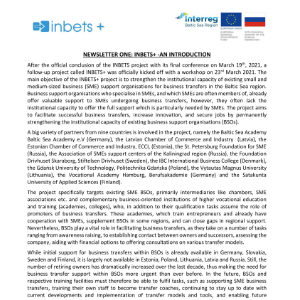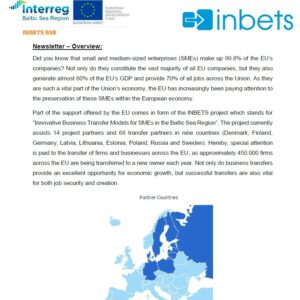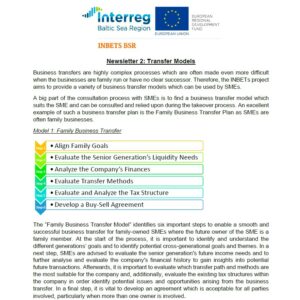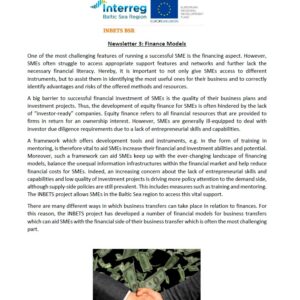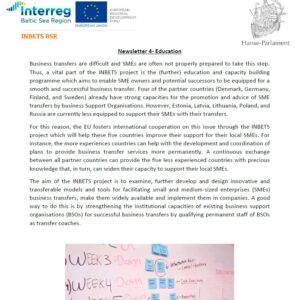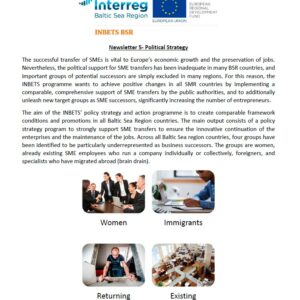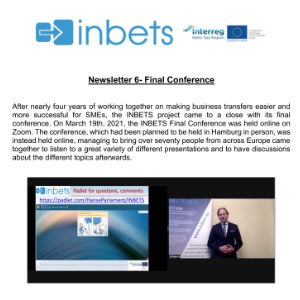Newsletter 5 – Political Strategy
The successful transfer of SMEs is vital to Europe’s economic growth and the preservation of jobs. Nevertheless, the political support for SME transfers has been inadequate in many BSR countries, and important groups of potential successors are simply excluded in many regions. For this reason, the INBETS programme wants to achieve positive changes in all SMR countries by implementing a comparable, comprehensive support of SME transfers by the public authorities, and to additionally unleash new target groups as SME successors, significantly increasing the number of entrepreneurs.
The aim of the INBETS’ policy strategy and action programme is to create comparable framework conditions and promotions in all Baltic Sea Region countries. The main output consists of a policy strategy program to strongly support SME transfers to ensure the innovative continuation of the enterprises and the maintenance of the jobs. Across all Baltic Sea region countries, four groups have been identified to be particularly underrepresented as business successors. The groups are women, already existing SME employees who run a company individually or collectively, foreigners, and specialists who have migrated abroad (brain drain).
Figure 1: Underrepresented groups in SME succession and takeovers
In order to build a supportive environment for SME transfer, the current political program includes strategies for four overarching thematic priorities that are of outstanding importance for the entire Baltic Sea region. These include ensuring the next generation of entrepreneurs and their qualification, as well as securing the financing of business transfers and a comprehensive service and consulting network for business transfers. While a lot of Baltic Sea Region countries have already developed comprehensive and effective programmes, as well as the infrastructure to promote and ensure business transfers, five partner countries (Poland, Lithuania, Latvia, Estonia and Russia) still need some assistance to establish equally well working structures. This is due to the fact that the vast majority of SMEs in the Eastern European countries was founded only after 1990 which has resulted in few business transfers (especially compared to the other countries in the Baltic Sea Region) in the first two decades or so. However, due to the growing number of SMEs and a growing number of SME owners wishing to retire, the support that the INBETS project can provide is especially important and urgent.
The goal of the project is to increase particularly the number of young entrepreneurs by 5% annually. In order to achieve this goal, and to additionally increase the numbers of female and immigrant, as well as returning entrepreneurs, the EU is aiming to build up the support framework for SME transfers which is currently missing in the Eastern European countries. As SMEs provide the Union with indispensable economic power, the INBETS project will support them by providing financial and technical support and further enabling multilateral knowledge exchange. This support is primarily provided through a multi-level entrepreneurial training programme aimed at all four underrepresented groups, as well as ensuring that the required funding is available to SMEs planning a business transfer.
A crucial part of the INBETS project is the sharing of already existing knowledge and experience on best practices for SME support by countries like Germany with those countries who are in the process of building their own SME support network. Not only does this sharing boost international cooperation between EU and non-EU partners, but also eliminates the need for creating new structures and support strategies from scratch. In order to enable this cross-country knowledge exchange, the establishment of a Baltic Sea Region-wide centre of competence for start-ups and business transfers is highly important. Such a centre will be able to act as an interface between the different countries, regions and institutions and can provide administrative assistance for struggling regional centres.
Women and SME leadership and takeovers:
Women are less likely to take over SMEs and other forms of businesses and the EU wants to change that. According to extensive research, the key factor limiting women’s professional activity is their engagement in home and family duties which is reflected in the time they spend doing unpaid work compared to men. Although both women and men generally do paid work for similar hours, with men usually working slightly more in paid jobs, in most partner countries women do between one and two hours more unpaid work per day. On top of that, women are generally less economically active and underrepresented on management boards. This is due to the fact that there still exists a segregation at the workplace, both horizontally (women are typically concentrated in underpaid and insecure jobs) and vertically (women are less likely to be promoted and rise to top managing positions), despite the fact that women lack neither education and expertise nor management and leadership skills.
Figure 2: Reasons for the lack of female SME successors
The type of companies and businesses which have seen the highest increase of women in management positions has been family businesses. This is because family businesses often offer women more independence, flexibility and greater job security. Nevertheless, the number of young women who take over family businesses remains low and usually only happens when there is no male possible successor. However, there are a number of actions that can be taken to increase the number of women in management positions in SMEs and particularly in family businesses (most SMEs are family businesses after all). For instance, desirable actions are the promotion of women’s achievement, encouragement of more diverse workplaces, as well as removing barriers to women’s progress and overcoming gendered stereotypes.
Employees:
Another often underrepresented group in business transfers and takeovers are already exciting employees, particularly those not in management positions. This is due to social and business hierarchies which prevent employees from even just voicing their intent to take over a business. However, employees make excellent potential successors for SMEs, particularly in cases where there is no willing successor or no successor at all in the owner family of the company.
For starters, already existing employees already have experience with the business and are well acquainted with the business, the branch, their colleagues and stakeholders. Furthermore, they have also already created contacts who will be able to assist them in their new role as CEO of a company. Due to their experience they also won’t struggle to create further new contacts and establish themselves as entrepreneurs. On top of that, employees will have the necessary skills and are familiar with processes, routines and phases of the SME and know the organisational structures of the company. However, they may need further entrepreneurial and financial training which the INBETS project is aiming to provide.
Thus INBETS project will develop and provide a number of tools for the evaluation and development of entrepreneurial competences, as well as tools for evaluating the value of an employee’s own knowledge and experience and a ‘matching tool’ to bring together potential investors and employees interested in acquiring a company.
Immigrants
While more and more people acknowledge the importance of having entrepreneurs with foreign origins, the numbers of immigrants who take over businesses is still comparatively small. This is despite the fact that for example in Germany more than 740,000 immigrant entrepreneurs contribute more than two million jobs to the economy. Additionally, successful SME takeovers can significantly contribute to the immigration of often highly skilled refugees.
Unfortunately, immigrants often struggle even more to access support services and networks compared to their local counterparts as they have to overcome bureaucratic and formal hurdles. They need increased support in three particular areas, namely faster recognition of their skills and qualifications, additional education to even out capability gaps compared to local entrepreneurs, and improved information and communication.
There is a stark need to provide immigrant entrepreneurs with more support, not only for the already existing immigrant SME owners, but also to attract more potential immigrants who are interested in acquiring a business. On top of that, iIn most Baltic Sea Region countries, the number of younger workers will decrease by up to 30% by 2030. For economic reasons alone, immigrants could be very welcome in many EU countries. However, excessive reliance on certificates, legal regulations and bureaucratic processes severely hampers the start of self-employment for immigrants. The formal and bureaucratic recognition of qualifications is often a major obstacle that prevents highly skilled migrants from being able to work in the host country.
In order for EU countries to be able to offer adequate support to immigrants, especially those interested in becoming entrepreneurs, the INBETS project developed an action programme to support migrants made up of five phases:
Brain-Drain and Remigration:
While migration of workers is not a new phenomenon, it has undoubtedly become easier and more popular since the EU has made free movement of labour one of the four economic freedoms for EU citizens. At the same time, demographic challenges within the EU such as population ageing, a decreasing fertility rate as well as an overall decline of labour force have caused a notable competition for skilled workforce.
Skilled workforce who has emigrated abroad, commonly referred to as brain drain, represents one potential target group in order to close the SME successors gap. In 2019 alone, 12.9 million people of working age (20-64) migrated within the EU and the numbers have been increasing over the past few years. The reasons for brain drain are often a combination of so-called pull and push factors. Undoubtedly, economic factors are most influential when it comes to migration, especially within the EU. Many skilled workers leave for higher wages, faster economic growth and high per capita wealth in foreign countries as well as better educational and professional opportunities. Moreover, easiness to access the labour market and overall higher employment rates are factors. Administrative barriers, economic depression (e.g. death of enterprises) can be push factors.
On top of economic factors, socio-cultural factors and the quality of live also play a big role for emigrants. For instance, cultural factors such as a gender-biased mentality and income inequality are push factors, as well as adequate health care and social security as well as physical and technological infrastructures are listed as main factors, but also the overall political environment.
According to the 2019 Annual Report on Intra-EU Labour Mobility, the main sectors of employment for emigrated workers are wholesale and retail trade, transportation and storage, accommodation and food service activities sectors.
The brain drain effect has had a number of negative consequences on EU countries that the INBETS project is trying to address and counteract. The biggest negative effect of brain drain is the resulting shortage of labour force and a reduction of the stock of human capital, which in turn leads to a limited capacity for innovation and technology development, reduction of wages, tax income and consumption. Hence, the result is an overall decreasing economic growth, higher costs of goods and reduced productivity.
Research has shown that BSR countries differ immensely regarding migration dimensions and types of migration as well as policies in place in order to promote return migration. While in Germany, Denmark, Finland and Sweden brain drain is not a big problem, Lithuania, Latvia and Poland urgently need to deal with the fact that a considerable number of skilled workers is constantly leaving the country. In fact, the Baltic countries have witnessed several massive emigration waves during certain periods – the Nazi and Soviet occupation, the collapse of the Soviet Union in 1990, the entry into the EU in 2004 and the 2009 global financial crisis. The United Nations estimates that the Baltic country population number will keep shrinking so that by 2050 Latvia’s population could decrease by 22 percent, Lithuania’s population by 17 percent and Estonia’s population by 13 percent.
Thus, strategies to bring back emigrants as SME successors could be one way to anticipate the negative effects of brain drain and would further counteract the increasing issue of lacking successors for SMEs.
Remigrants have a strong potential to become successful SME successors for various reasons. For example, they approach business with an international approach and often bring with them an international network of contacts.
For this reason, the INBETS project has come up with two particular measures to encourage remigration within EU countries, a family programme and a business programme. The family programme encompasses integration and support programmes for partners and children of people wishing to move back to their home countries in order to make them feel more welcome and to encourage young people to remigrate. This support can be provided in the form of cost support, easy and fast provisions of residency permits which should also be offered in English. For the business programme, the project aims to build special remigration business support networks, as well as an increase in the digitalisation of the market and services and encourages international cooperation. With a combination of these programmes and the exchange of knowledge, expertise and experience, the EU will take a significant step towards not only increased preservation of jobs and businesses, but also towards increased multilateral cooperation and economic growth across Europe and around the Baltic Sea Region.
The newsletter can be accessed as a pdf file here (it is also possible to click on the picture below to download the file) […]



